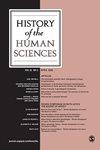1879-1928年,精神康复、公民角色和精神护理协会
IF 0.5
2区 历史学
Q2 HISTORY & PHILOSOPHY OF SCIENCE
引用次数: 0
摘要
这篇文章论证了研究精神疾病后生活的重要性。很大一部分患有精神疾病的人会康复,但这种经历会继续影响他们的生活。通过心理后护理协会(MACA)对心理后护理诞生的历史考察,突出了1879年至1928年间从英格兰和威尔士精神病院出院的人所面临的挑战。本研究证明了精神康复观念与公民身份之间的关系。在整个期间,精神失常证明机构治疗剥夺了病人的地位和公民权利。康复出院使病人恢复了获得公民身份的合法途径,但对他们参与社会的权利和能力的怀疑仍挥之不去。MACA设计了善后护理,以促进恢复完全公民身份。MACA是积极的公民运动的产物,根据该运动,一个人作为公民的权利取决于对社区的某些义务的履行。这些义务根据社会经济地位和性别而有所不同,这意味着每个人都被规定了按性别划分的个人公民角色。MACA人员将他们的努力视为自己公民角色的一部分,并相应地设计了他们的待遇。MACA使用患者对公民角色的假设来表明康复,并认为支持该角色的表现对出院康复的患者具有心理治疗效果。因此,MACA的工作人员将积极公民的自由政治和社会价值观注入精神病学的后护创新中。本文章由计算机程序翻译,如有差异,请以英文原文为准。
Mental recovery, citizenship roles, and the Mental After-Care Association, 1879–1928
This article argues for the importance of studying life after mental illness. A significant proportion of people who experience mental illness recover, but the experience continues to affect their lives. Historical examination of the birth of mental after-care through the Mental After-Care Association (MACA) highlights the challenges faced by those who were discharged recovered from English and Welsh lunatic asylums between 1879 and 1928. This research demonstrates the relationship between ideas regarding psychiatric recovery and citizenship. Throughout the period, certification of insanity for institutional treatment stripped patients of the status and rights of citizenship. Discharge on account of recovery restored a patient's legal access to citizenship, yet suspicions about their right and ability to particate in society lingered. The MACA designed after-care to facilitate restoration to full citizenship. The MACA was a product of the active citizenship movement, according to which, one's right to identify as a citizen depended on the performance of certain duties to the community. These duties varied according to socio-economic position and sex, meaning that each individual was prescribed a gendered personal citizenship role. MACA personnel saw their endeavours as part of their own citizenship roles, and designed their treatments accordingly. The MACA used a patient's assumption of a citizenship role to indicate recovery, and believed that supporting the performance of that role had mentally healing effects for patients who had been discharged recovered. MACA workers thus imbued the psychiatric innovation of after-care with the liberal political and social values of active citizenship.
求助全文
通过发布文献求助,成功后即可免费获取论文全文。
去求助
来源期刊

History of the Human Sciences
综合性期刊-科学史与科学哲学
CiteScore
1.60
自引率
11.10%
发文量
31
审稿时长
>12 weeks
期刊介绍:
History of the Human Sciences aims to expand our understanding of the human world through a broad interdisciplinary approach. The journal will bring you critical articles from sociology, psychology, anthropology and politics, and link their interests with those of philosophy, literary criticism, art history, linguistics, psychoanalysis, aesthetics and law.
 求助内容:
求助内容: 应助结果提醒方式:
应助结果提醒方式:


